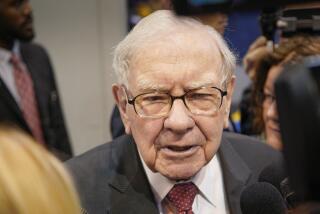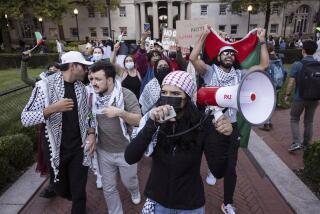Boston a Home for Bin Ladens
- Share via
BOSTON — One brother is a graduate of Harvard Law School. Another owns swanky condos on the waterfront here. Another is an accused international terrorist--and one of the most reviled men on Earth.
With more than 50 siblings and an enormous fortune, it is little wonder that the Bin Laden family has a global reach. But Boston is where Tuesday’s terror began. And the Bin Laden ties here turn out to be tight.
A $1-million gift “from the generosity of the Bin Laden family” promotes the study of Islamic law at Harvard Law School. At Harvard’s Graduate School of Design, another $1-million donation from the Bin Ladens endows students and professors who pursue the field of Islamic art and architecture.
Abdullah M. Binladen, a 1994 graduate of Harvard Law School, has offices in Cambridge, though he did not respond to telephone requests for comment. Another brother, Mohammed M. bin Laden, owns six units in the luxurious Flagship Wharf complex in Charlestown, close to where the Constitution is docked. The management of the building--where apartments range from $300,000 to $2 million--would not discuss any of the residents. The family surname apparently is rendered in different ways in English.
The endowments to Harvard, made in the early 1990s, came from the Saudi Bin Laden Group, a collection of family members in Jidda, Saudi Arabia, university spokesman Joe Wrinn said. The Bin Laden family operates Saudi Arabia’s largest and richest construction company.
Though the grants to Harvard have come under scrutiny, “that group is in no way associated with terrorism,” Wrinn insisted.
In fact, he said, “they have disassociated themselves from Osama bin Laden.”
Indeed, the Saudi-based family disowned Osama bin Laden in the early 1990s because of his anti-Americanism and his extremist interpretation of Islam. In 1994, Saudi Arabia’s government stripped his citizenship for the same reasons.
Adil Najam, a professor of international relations at Boston University, said the action by Bin Laden’s siblings was more than simple disavowal.
“There is an active hatred relationship,” Najam said. “The first thing they tell you is that they have no affiliation with Osama.”
The clan descends from Sheik Mohammed bin Laden. When he died in 1968, the family patriarch left behind more than a dozen wives in a number of countries--including Lebanon, Syria, Jordan and Saudi Arabia.
The multibillion-dollar family business was built around massive construction projects at Middle East holy sites, including Mecca. A group of the oldest brothers runs the empire.
Much of the family was at odds with the outcast brother even before he began his campaign of global terror, according to Najam, an expert on the Middle East. The original schism came because “he is an anti-monarchist in a family that is extremely monarchist,” Najam explained. The family, in turn, bases itself in a country that is a strong monarchy, he said.
The Bin Laden fortune is so huge that Osama’s share often is estimated at $300 million. “Multiply that by 54. It’s a lot of money,” Najam said.
The family amassed the wealth by serving as the Saudi king’s preferred construction company, Najam said. Airports, roads and entire cities built in Saudi Arabia over the last half a century have had the Bin Laden stamp on them, Najam said.
But within the context of multiple mothers and sibling groups scattered across various countries, “what it means to be a brother or sister may be somewhat different from what you or I may think,” Najam pointed out.
Intra-family politics are complicated, he said. “It’s not always one big family under one big roof. Often there is a fierce sense of competition, and it is not unusual for those competitions to end up in physical violence.”
On numerous trips to Saudi Arabia, John Duke Anthony, president of the National Council on U.S.-Arab Relations in Washington, has visited the Bin Laden family.
The brothers there long have distanced themselves from the terror suspect Osama, Anthony said.
“If you think of this as a society that puts great stock in honor as a value, and does its utmost to avoid shame, he has dishonored and shamed the family in the perception, evaluation and judgment of his siblings,” Anthony said.
By extension, he suggested, funding Harvard--one of the world’s most prestigious academic institutions--could be seen as a way to cast honor upon the family.
“Look at it this way: In Islam, education is a highly prized value,” Anthony said.
With such extensive resources, Bin Laden family members can afford to “live globally, rather than locally,” said political science professor Robert F. Seibert of Knox College in Illinois.
The concentration of colleges and universities could help explain why several brothers settled in Boston, said Seibert, author of “Politics and Change in the Middle East.”
Besides, he said, “they do have a coastal mentality. You find the Bin Ladens on the East Coast or the West Coast.”
But beyond philanthropy or real estate, the family has a less savory connection to Boston. Two former Boston taxi drivers have been identified as associates of Osama bin Laden. Bassam A. Kanj, a Lebanese native who lived in the Boston area for 15 years, was killed last year in northern Lebanon. Raed M. Hijazi was jailed in Jordan for threatening to blow up a hotel. Federal investigators reportedly have conducted interviews at the cab company where both worked.
Not surprisingly, institutional Boston is uneasy about focusing on the Bin Ladens.
At Harvard, spokesman Wrinn emphasized that the family has had no oversight--and in fact, no direct involvement--with either grant to the school. He added that, since the first gift in 1993 “and to this date, we have had no indication whatsoever that the money has had any connection to any form of terrorism in general, or to Osama bin Laden specifically.”
Should that change, Wrinn said, “Harvard obviously would take appropriate steps.”
More to Read
Sign up for Essential California
The most important California stories and recommendations in your inbox every morning.
You may occasionally receive promotional content from the Los Angeles Times.













